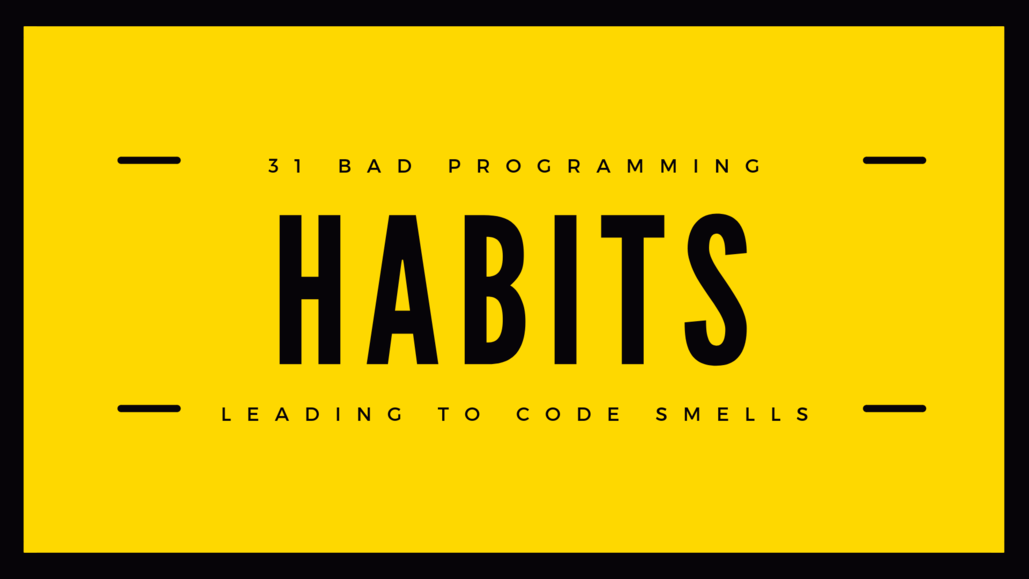Bad habits are tough to break and much tougher if you do not realize what you are doing is endangering your own work. If you understand but do not care that is the even worse. But you are here, are not you?
As a developer, I have seen a great deal of poor practices, not only around code, but also about teamwork abilities. I have been guilty of practicing several of those bad habits. Listed below are best 30 bad programming habits that I found and most of them I practiced, arranged into four classes: code organization, teamwork, writing code, and testing and maintenance.
Code Organization
1. Saying, I will fix it later
The custom of postponing code fixes isn’t only an issue of priorities. Organizing your problem tracker may generate some improvement, but in addition, you must have a means of tracking smaller problems which come up as well. Doing “To do” comments at all necessary place is a fast method of earning certain that you don’t overlook anything.
2. Insisting to a one-liner solution
Being fanatical about writing effective, elegant parts of code is a frequent characteristic of developers. It is like solving a mystery –you locate a mix of routines and regular expressions which turn 20 lines of coding into 3 or 2. Regrettably, it does not always lead to readable code, and that is generally a lot more significant consequence. Make your code readable first, then smart.
3. Making pointless and unnecessary optimizations
Another location where we often misplace our efforts is optimizations. It seems fantastic to decrease the size of your site several bytes, but won’t gzip compensate for it anyway? And aren’t fix and features requests more important? Moving such optimizations to the end of the project when you have some free time and requirements won’t change sounds a better option
4.Making yourself believe that styling problems aren’t that Significant
If I’ve learned anything after more than years of looking at other people’s code, then it is that coping with coding style issues is what that developers are most likely to delay. Perhaps it’s hard for inexperienced developers to find out the advantages of addressing such styling issues, but over time it will become clear that once code quality goes down, soon your project will become a complete mess. Make sure to stick to best practices even if it is regarding styling of code.
5. Sweeping things under the rug
Either by catching and dismissing exceptions or utilizing libraries that don’t report errors (for instance, jQuery), there are numerous approaches to sweep things under the rug. But when these errors become a priority, the battle of mending it will be several times bigger, believing that you will not have any idea where to get started. A easy method to stop this is by simply logging those blown off errors so you can study them later.
6. Using names that don’t add Info
Naming is tough, but there is a simple method to be certain that your variable and function names are of adequate quality. Provided that the naming adds some sort of information which the remainder of the code does not communicate, other programmers are going to have an easy time going through and getting your own code. The reason why naming is so essential is that titles/names can give an overall idea about what the code does. It requires more time if you have to dig to the calculations to determine which bit of code, but a fantastic name can help you know what the code will in minutes.
Teamwork
7. Abandoning plans too early
A cent percent sure way for creating your code unreadable and cryptic would be not to commit to a strategy. You could always say, if your code is criticized, the program is not complete. But, having half-done modules can result in tightly coupled code once you attempt to create those partially done modules work with one another. This type of complication comes up when new project leader comes in and they think having their way is more important than architectural consequences.
8. Insisting on a Strategy that has little Prospect of working
Just as if giving up a strategy very quickly can cause problems, so is the case with sticking to the strategy that does not work. That is the reason you need to discuss your thoughts with your staff to get opinions and advice if things become tricky. On occasion a different approach could make all of the difference.
9. Refusing to write bad code
There is a time in each programmer’s lifetime when deadlines will make you write code that is awful, which is fine. You have attempted warning your customer or manager regarding the impacts, but they insist on adhering to this deadline, so now it is time to code. Or maybe there is an urgent bug that can not wait for one to think of a fresh solution. That is why it’s essential to be flexible as a developer and also to have the ability to write bad code quite quickly in addition to great code.
10. Blaming others
Accepting responsibility for your errors is a merit which will cause you to glow among your peers. Do not be afraid to admit that you have made a mistake. As soon as you’re alright with this, you’ll be free to concentrate on learning the reason you made that error and how to prevent it. If you do not own it up, learning becomes impossible.
11. Not sharing with your team what you have learned
Your worth as a programmer does not only depend on the code that you write, but also on what you understand when writing/developing it. Share your own experiences, write remarks about it, let’s understand why things are the way they are, and also help them understand new things about the task/project and its intricacies
12. Being Overly slow on Providing feedback to managers/clients
Being too slow on getting everyone else on the same page is an issue as well. Among the very valuable personality traits of any craftsman lies in making certain everyone is on precisely the exact same page concerning the job, as far as you can. The cause of this isn’t so that your supervisor can fill spreadsheets. It is for your personal profit too: You may have fewer insecurities and decrease uncertainty about the future and lifetime of the job.
13. Not using Google enough
Every time you face a problem, make sure you just google it. There is large communities there like Stackoverflow that can quickly help you. You can also developer next to you for help, but they might be busy. So just googling for solution will save your and others time and you will find appropriate and quick solution.
14. Overvaluing your personal style
Make sure to coordinate with your working style and environment setup with your team. Ideally, everyone on your staff should be operating under similar circumstances and observing the exact same coding style. Doing things your way might be more enjoyable, but co-workers may not be employed to your programming style, and when it is odd, it is going to be more difficult for another developer to focus on what you have wrote and built.
15.Don’t be romantic about to your own code
If someone comments about your code, do not take it personally. Your code must stand on solid earth; that’s, you need to be able to describe why you wrote it like that. In case it needs improvement, that is only a manifestation of this code’s correctness, not yourself.
Writing Code
16. Optimizing in a wrong way or Not knowing how to optimize
A fantastic optimization strategy requires some expertise to get right. It requires exploration, investigation, and understanding each system involved with a procedure. Inform yourself about such items. Learn about algorithmic sophistication, database query analysis, protocols, and also the best way to measure performance generally.
17. Using the wrong tool for the job
Always be receptive to new languages and libraries You can just understand a lot, however the reason you need to keep learning is that each new issue attracts another circumstance and demands another instrument –more relevant to the task available. Don’t make decisions based purely on what you know.
18. Not trying to master your tools and IDE
Every new shortcut or hotkey you understand while utilizing the tools that you work with each day is going to have a more favourable impact in your coding rate than you understand. It is not about saving a couple of seconds using a hotkey; it is about reducing the context switching. The longer spent on every little action, the less time you will have available to consider why you are doing it and on what comes next. Mastering shortcuts will free your brain.
19. Ignoring warnings and error messages
Don’t assume that you understand what’s wrong with your code before reading an error message, or that you’ll figure it out fast enough. Having more information about a challenge is obviously better and taking the opportunity to gather that info will save yourself more time in the long run.
20. Ignoring configurable values and using hardcoded values
Give extra importance to configurable values. Constantly be considering what changes can come along with how to handle them. Technical debt will expand at a massive rate in the event you don’t split the moving pieces from the remainder of your work. Use constants and configurations where appropriate.
21. Trying to reinvent the wheel all the time
Never reinvent the wheel. Do not write code that you don’t need to. Perhaps someone else has invested a great deal of time in your own problem, and they may have a well-tested alternative that you may reuse. Save yourself some trouble.
22. Blindly copying and pasting code
Making sure you don’t blindly copy and paste code and you understand it before you use it. Sometimes you do not immediately detect what the code is doing. You’ll also learn more about a problem when you take a chance to navigate the code in detail.
23. Not allotting enough time to learn how things really work
Always take the chance to broaden your knowledge by contemplating how things function and studying about their inherent issues. You may save time by not bothering currently, but everything you find out on a job will be significant in the long run.
24. Being overconfident about your own code
It is not good to assume that simply because it is something that you built or coded, it has to be great. You find out more about programming since you work on new items and gain expertise, so have a peek at your previous code from time to time and reflect on how you have improved.
25. Not giving thoughts to the trade-offs of each design, solution, or library
Everything comes with pros and cons. Every product has its fine things you’ll just learn about using and assessing it. Seeing a couple of usage examples to get a library won’t make you a grasp of it nor does it imply that it is the perfect match for each situation that will appear on your undertaking. Be constantly critical of all you use.
26. Not asking help when you’re stuck somewhere
Asking for help does not mean that you’re incompetent. It is important to keep a short feedback loop. It will make thing less painful for you. The perfect people will understand your attempt as an effort to learn more, and that is a fantastic virtue to get.
Testing and maintenance
27. Writing tests to pass and not writing the ones that will not pass
Writing unit tests, you know will pass is essential. They’ll make reorganizing and refactoring a code much safer. On the reverse side, you also need to write evaluations you understand will not pass. They are important to move the project forward and keep an eye on issues.
28. Not considering performance testing important enough for critical cases
Make sure to set up an automated testing process at some time after project is started, probably at middle point of the development. It will help you know if you are having escalating performance issues.
29. Just focusing on build passing and not checking that your build works
It is not very common that every time as build passes, it getting the job done in exact way. Quickly testing and analysis every build that passes is a good habit to have.
30. Not owning code you wrote
Don’t hesitate to own your code. You are probably the only person who can better help others understand your code. You need to aim to make your code remain readable to yourself and others many years from today.
31. Disregarding and ignoring non-functional requirements
It is very probable to happen that you sometimes forget about essential requirements like performance and security when deadlines are approaching or you are trying to deliver something really quickly. Keep a checklist for those. You don’t want them destroying your party since you drafted your deadlines before contemplating these non-functional requirements.
Improving how you work through habits is a great way to avoid having to think a lot about each and every situation. As soon as you have assimilated a perfect method of doing something, it is going to end up effortless. If you’d like to talk about some other programming customs which you consider detrimental, or you want to criticize mine, then write a comment, and let’s talk.
Related Articles:



